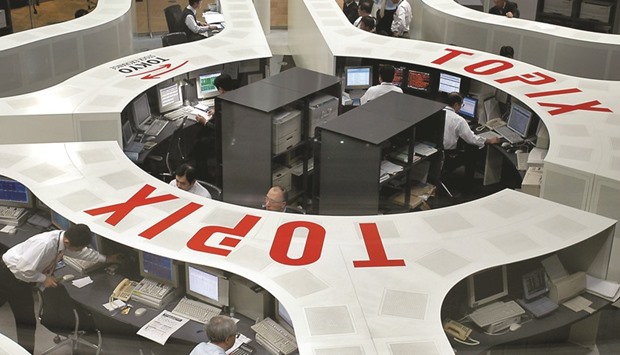Even if you were never a believer in Abenomics, Japanese stocks are looking cheap relative to government bonds.
The estimated earnings yield on the Topix index reached 8.1 percentage points more than the 10-year bond yield on February 12, the most since July 2012, five months before Prime Minister Shinzo Abe kicked off his stimulus policies.
With the Bank of Japan’s negative interest rate policy pushing yields below zero, equities are even more attractive, according to Nomura Holdings and Mitsubishi UFJ Kokusai Asset Management.
“Stocks are evidently oversold,” said Kiyoshi Ishigane, chief strategist at Mitsubishi UFJ Kokusai Asset in Tokyo, which oversees the equivalent of more than $105bn. “Bonds used to have much higher yields before and now the world has totally changed. I expect the gap between stock dividend yields and 10-year JGB yields to eventually shrink.”
An equity rout that erased $1.1tn from the Topix index this year prompted investors to park their cash in the relative safety of sovereign securities. It’s also helped spur calls for expanded BoJ stimulus to revive an economy that contracted in the final months of 2015.
The Topix traded at book value last Friday, falling to the lowest levels since the early days after Abe came to power at the end of 2012.
It also had the cheapest valuation since September that year based on estimated earnings.
Dividend yields are projected to rise to 2.29% for the Topix over the next 12 months, up from 1.61% in 2013. The dividend payout ratio has also jumped to 32%, up from 26% two years ago.
Nomura is predicting that the Nikkei 225 Stock Average may surge to as high as 22,000 at the end of the year, 36% higher than Thursday’s close. Japan’s biggest brokerage sees “ample upside” in domestic equities, citing key possible catalysts including a double election for the Diet’s upper and lower houses and a postponement of the scheduled consumption tax hike, it said in research note dated February 16.
By contrast, about two of every three JGBs offer sub-zero yields, after the BoJ’s negative rates pledge combined with haven demand driven by turmoil in global markets.
The benchmark 10-year sovereign debt yield slumped to a record minus 0.035% on February 9, the first for any Group-of-Seven economy. Almost three years since Governor Haruhiko Kuroda launched quantitative easing in April 2013, the central bank’s benchmark consumer-price gauge that strips out fresh food prices is languishing near zero.
“The reason long-term bonds yields are so low is because there’s so little expectation that Japan will be able to escape deflation,” said Masaru Hamasaki, head of the investment information department at Amundi Japan. “Unless that view changes, we’ll keep having low yields.”A combination of lacklustre domestic growth and dissatisfaction with the latest round of monetary easing is strengthening views that the central bank will take further action.
The BoJ should act preemptively to change the deflationary mindset in Japan and this action could come as soon as March, said Etsuro Honda, an adviser to the prime minister.
So long as the yen remains weaker than 110 per dollar, Japanese companies will be able to sustain profits, leading to higher share prices, according to Amundi’s Hamasaki. If the price-earnings ratio recovers to earlier levels, the Nikkei 225 may rise back above 18,000, he said. The measure closed at 16,196.80 on Thursday.
“Concerns are racing ahead while good factors are being ignored in the current market,” said Mitsubishi UFJ Kokusai’s Ishigane. “In six months’ time, the equity market should be much stronger than where we’re at now.”

Traders work at the Tokyo Stock Exchange. An equity rout that erased $1.1tn from the Topix index this year prompted investors to park their cash in the relative safety of sovereign securities.
